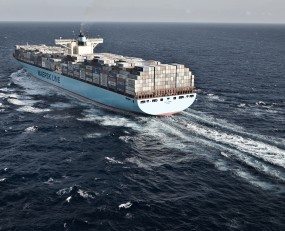
The shipping sector has traditionally been wary of adopting technology from beyond marine engineering. However, Maersk’s pioneering attempts to propel the container business into the 21st century through the application of web-based tools appears to be gaining momentum.
Last year Maersk and IBM established a blockchain-based concept that seeks to make information dynamics within the process of ocean container transport both more coherent and more transparent.
Called ‘TradeLens’ it offers the ability to track containers through landside transport as well as whilst on-board ship. In addition, it offers tools to share and analyse data between different parties in the supply chain. However, perhaps its most immediate impact is that it enables paperless transactions for many of the processes around container shipping.
At first it appeared that it was really a proprietary tool for Maersk, reflecting the company’s broad push into technology applications in shipping. Yet in May, Mediterranean Shipping Lines and CMA CGM joined the initiative and on Tuesday (July 2) Hapag Lloyd and the ONE Network announced that they too would offer the service to their customers. As a consequence, TradeLens can now be accessed by shippers accounting for around two-thirds of all containers moved. This suggests that it will become the default option for visibility and communication in ocean freight.
There are some problems. COSCO has established a rival system which CMA CGM has also joined, offering their customers a choice of solutions. This may suggest some fragmentation in the market, with Chinese shippers under pressure to use this rival solution. Nonetheless it appears that TradeLens has very much established a lead purely as a result of the volumes that its participants can command.
The prospect is of a significant step forward in the quality of service offered by the container shipping sector but also a powerful tool for shippers enabling superior inventory management. If this works it would represent a considerable change in the container shipping sector.
Source: Transport Intelligence, July 4, 2019
Author: Thomas Cullen